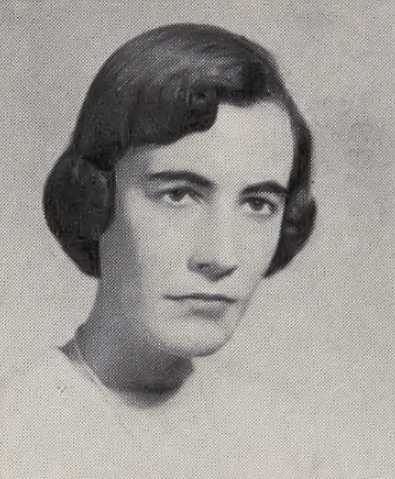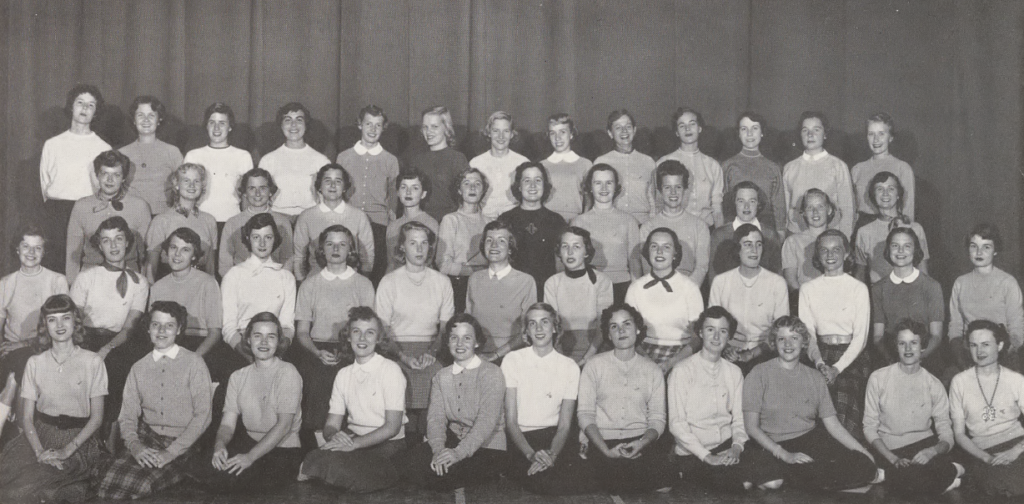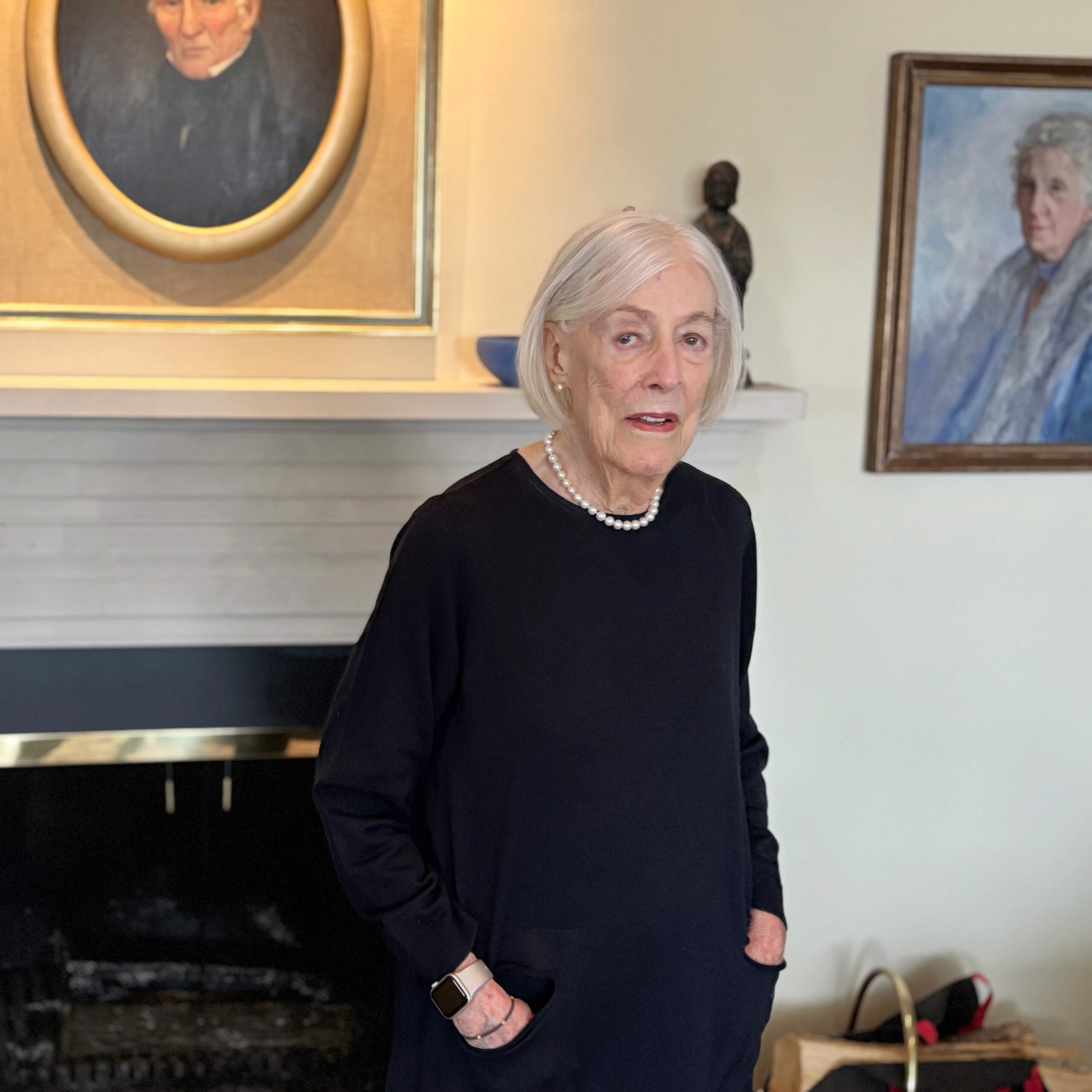By Evan Young | April 21, 2025
Molly (Stark) Strassner, BS ’66, MA ’76, embodies lifelong learning.
The 91-year-old holds a relatively unique distinction among her fellow WashU alumni, having studied at the university during five of the last seven decades. Strassner began her WashU career in the early 1950s, returned to complete her undergraduate degree in the mid-1960s, and earned a master’s degree from the university in the mid-1970s.

Her WashU journey continues to this day. For more than 15 years, Strassner has regularly attended classes at the Osher Lifelong Learning Institute (OLLI), a membership community that offers interactive courses and lectures for older adults.
“I’m a great proponent of OLLI,” she says. “It’s a good vehicle for staying connected with the older community.”
Strassner grew up in Louisiana, Missouri. Her father Lloyd Stark was vice-president and general manager of Stark Brothers’ Nurseries & Orchards and served as Missouri governor from 1937 to 1941.
Though her hometown is more than 80 miles outside of St. Louis, Strassner has always thought of herself as living in the Gateway City. She came to St. Louis to attend high school at John Burroughs School in Ladue and lived with her grandmother in Clayton.
“I enjoyed it very much and developed a lot of independence because I didn’t live with my parents, though they were always available,” Strassner says. “It was the best of both worlds.”
After graduating, Strassner studied at Vassar College in New York but decided to return to St. Louis after one year.
“It was much more like what a boarding school is now,” she says. “I felt like I’d been demoted in a way since I’d had my independence in a way that most high schoolers didn’t.”
Strassner was already familiar with WashU. Her grandmother lived within walking distance of the main campus, and Lloyd Stark received an honorary law degree from WashU during his final year as Missouri governor. Strassner began studying English at the university and joined the Pi Beta Phi sorority.

But she put her undergraduate career on hold a year before she would’ve graduated so she could join her husband, Richard, in Atlanta, where he was stationed with the Army. They moved back to St. Louis in 1956 after Richard completed his military service, but Strassner didn’t return to WashU right away. She spent the next decade volunteering and raising their three children.
“A lot of women in my generation didn’t feel they had to graduate because we didn’t have careers,” she says. “Some people did, but most of us didn’t.”
When she returned to WashU in the mid-1960s, she enrolled in University College, now WashU Continuing and Professional Studies, because it was more affordable and allowed her to complete her undergraduate English degree on her own schedule.
“Going back as an adult woman in my 30s, I was often the grown-up in a class of undergraduates,” Strassner says. “When my kids were little, I would go to one of the libraries to do my homework or write papers. I couldn’t do that at home with kids running around all the time. It was very fun for me.”
Strassner’s many years of volunteer work inspired her to return to WashU again in the mid-1970s and earn a master’s degree in counseling. She took a part-time counseling job at Mary Institute, a private girls K-12 school in Ladue, and was the head of the high school by the time she left nine years later. She continued to take interim leadership roles at independent schools around the country, “which I loved,” she says.
“They were like little projects. They had a beginning, the first of June, and you were done the end of June the following year,” Strassner says. “Some people said, ‘You don’t have any power.’ Quite the contrary. You have a lot of it because you’re not going to be there after a year, so you’re free to see what you can accomplish.”
“I’m a great proponent of OLLI. It’s a good vehicle for staying connected with the older community.”
Molly Strassner, BS ’66, MA ’76
When Strassner returned to St. Louis after one of her interim stints, her close friend, Anne Hetlage, invited her to check out a class at OLLI, which was then called the Lifelong Learning Institute. Hetlage and other volunteers helped launch the institute in 1995, and she served as an associate dean.
Strassner found the course selection and low-commitment, eight-week sessions appealing, and she has attended ever since. She typically takes two courses per session and especially enjoys classes on politics, Black literature, and World War II.
OLLI became even more important for Strassner during the COVID-19 pandemic and after she injured her back a few years ago. The institute’s virtual sessions, which it continues to offer, allowed her to keep attending class when she couldn’t leave her apartment.
“I do exercise classes and OLLI classes,” Strassner says. “I’m in my 90s, and I still need to have something to do. It’s a lifeline.”
Related stories
WashU Homecoming through the years
Just as the leaves change when the crisp October wind blows in, so too has Homecoming at WashU changed through generations of students, alumni, parents, and friends.
Q&A: Mario Treto Jr. carries WashU experience in public policy role
As the head of one of Illinois’ lead regulatory agencies, Mario Treto Jr., AB ’07, says the global perspectives he encountered at WashU inform how he functions as a public official.
